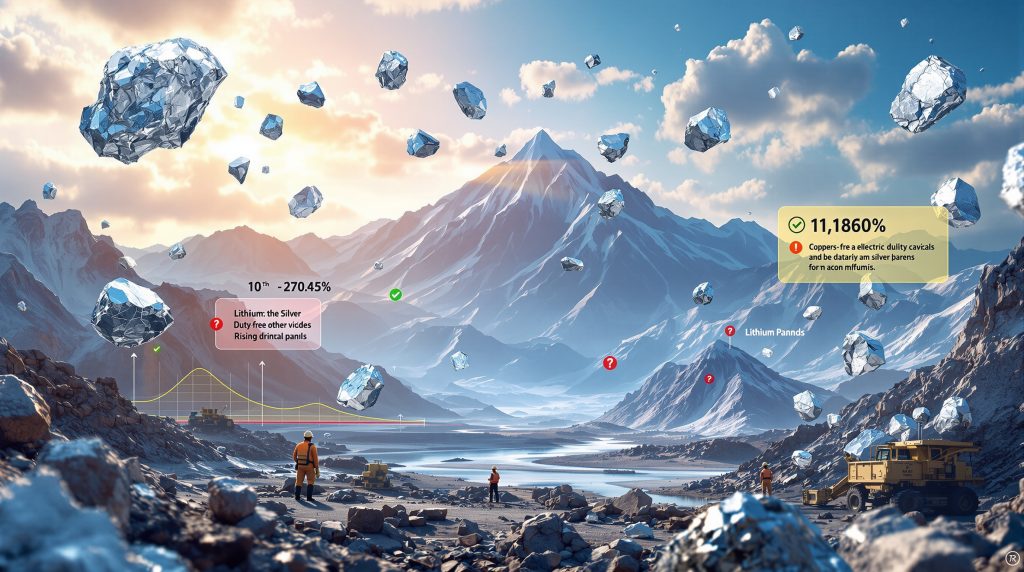Argentina Mining Industry Pushes for Complete Export Duty Elimination on Silver and Lithium
While Argentina's mining sector recently received a boost through Decree 563/2025, which eliminated export duties on approximately 200 minerals, industry advocates argue the reform remains incomplete without including two critical resources: silver and lithium. The Group of Mining Exploration Companies of Argentina (GEMERA) has welcomed the initial reform but continues to push for comprehensive duty elimination across all strategic minerals to maximize the country's geological potential.
Current Status of Mining Export Duties in Argentina
Decree 563/2025 represents a significant shift in Argentina's mining policy, reducing export duties to 0% for approximately 200 metallic and non-metallic minerals. This reform directly benefits key mining provinces including San Juan, Catamarca, Santa Cruz, Salta, Jujuy, Mendoza, La Rioja, Río Negro, Córdoba, and Neuquén. Currently, products like copper, limestone, marble, ornamental stones, borates, and coal enjoy duty-free export status.
However, two notable exclusions from this duty elimination have drawn criticism from industry stakeholders: silver and lithium. These resources, crucial for the global energy transition, remain subject to export duties, creating what industry groups describe as an "incomplete" reform.
The decree aims to increase Argentina's competitiveness in the global mining industry evolution while encouraging new exploration activities. Government officials have positioned this reform as part of a broader strategy to attract international investment to Argentina's mining regions, many of which possess significant untapped geological potential.
Economic Impact of Recent Mining Reforms
The elimination of export duties is expected to generate substantial economic benefits across at least 10 provinces with active mining operations. Provincial economies heavily reliant on mining, such as San Juan and Catamarca, stand to gain significantly through increased investment and operational expansion.
Mining industry representatives point to several immediate economic impacts:
- Enhanced exploration activity: Companies can redirect funds previously allocated to export duties toward new exploratory campaigns
- Improved international competitiveness: Duty elimination places Argentina on more equal footing with regional competitors
- Employment stability: Existing operations gain financial breathing room to maintain or expand workforce
- Investment attractiveness: International mining companies view duty elimination as a positive signal for long-term operations
"The elimination of export duties represents a key incentive for exploration, as it facilitates the attraction of risk capital and strengthens provincial economies," stated GEMERA in their official response to the decree. However, they emphasized that these benefits remain limited without extending the same treatment to silver market dynamics and lithium.
Economic analysts estimate that the full potential of Argentina's mining sector remains unrealized due to policy inconsistencies across different mineral categories. A comprehensive approach would likely generate substantially greater investment inflows.
Why Mining Explorers Demand Further Reform
GEMERA's Position on Export Duties
The Group of Mining Exploration Companies of Argentina (GEMERA) has formally welcomed Decree 563/2025 as a positive step toward revitalizing the country's mining sector. However, the organization has been vocal about what it considers an incomplete reform that fails to address all strategic minerals equally.
GEMERA's official position emphasizes that including lithium and silver would "contribute to further enhancing this comprehensive and strategic vision of Argentine mining. This is key to diversifying investments and fully exploiting our geological potential, which is currently underexplored."
The organization has highlighted three primary concerns:
- Inconsistent treatment of strategic minerals creates market distortions
- Competitive disadvantage against neighboring countries with more favorable fiscal terms
- Missed opportunity to fully capitalize on growing global demand for energy transition minerals
GEMERA's advocacy extends beyond just export duties, encompassing a holistic approach to mining policy that includes tax recovery mechanisms and regulatory stability—all aimed at positioning Argentina as a premier mining destination.
Strategic Importance of Lithium and Silver
Both lithium and silver play crucial roles in the ongoing global energy transition, making their exclusion from duty elimination particularly problematic from an industry perspective.
Lithium: Often called "white gold," lithium serves as an essential component in:
- Electric vehicle batteries (powering the transportation revolution)
- Grid-scale energy storage systems (enabling renewable energy integration)
- Consumer electronics (powering the digital economy)
- Industrial applications requiring lightweight, high-energy-density power sources
Argentina's lithium resources are concentrated in the "Lithium Triangle"—a region spanning Argentina, Chile, and Bolivia that contains approximately 75% of the world's known lithium reserves. The country's salt flats (salares) in Jujuy, Salta, and Catamarca provinces offer ideal conditions for lithium extraction, making Argentina lithium insights increasingly valuable to global investors.
Silver: This precious metal has evolved beyond its traditional monetary and jewelry applications to become integral to renewable energy technologies:
- Solar panel manufacturing (silver paste for electrical contacts)
- Wind turbine systems (electrical connections and control systems)
- Electric vehicle components (high-reliability electrical contacts)
- Energy-efficient building technologies (specialized glass coatings)
Argentina ranks among the world's top ten silver producers, with significant untapped potential in several provinces. The interconnection between silver mining and renewable energy manufacturing creates potential for integrated supply chain development within Argentina.
Industry experts note that both minerals represent "future-facing commodities" whose strategic importance will likely increase as global decarbonization efforts accelerate. This makes the fiscal treatment of these resources particularly consequential for Argentina's long-term economic positioning.
Additional Reforms Sought by Mining Companies
VAT Recovery System Challenges
Beyond export duties, mining exploration companies face significant challenges with Argentina's Value Added Tax (VAT) recovery processes. This issue creates substantial cash flow problems that disproportionately impact exploration activities.
Mining exploration represents what GEMERA describes as "pure risk capital where each dollar invested is reinvested in new exploratory campaigns." Unlike production operations, exploration generates no immediate revenue while requiring substantial upfront investment—creating unique VAT recovery challenges for the sector.
Current VAT recovery issues include:
- Extended processing timelines that can stretch beyond 12 months
- Complex documentation requirements creating administrative burdens
- Inconsistent application across different provinces and projects
- Cash flow constraints that limit exploration scope and intensity
GEMERA has emphasized that "a more agile recovery would allow sustaining the exploration rhythm in search of new discoveries." This perspective highlights how seemingly technical tax administration issues directly impact mineral discovery rates and long-term resource development.
Industry representatives point to international best practices, such as those in Chile and Australia, where streamlined VAT recovery mechanisms specifically designed for exploration activities have successfully stimulated new mineral discoveries, according to recent analysis from mining experts.
Comprehensive Fiscal Framework Needs
Mining companies are advocating for a holistic approach to Argentina's mining fiscal regime that extends beyond individual tax modifications. This comprehensive framework would address several interconnected elements:
- Competitive fiscal terms for all strategic minerals, including lithium and silver
- Efficient tax recovery systems designed for exploration's unique cash flow profile
- Zero export duties across the entire mining value chain
- Regulatory stability guarantees to protect long-term investments
- Streamlined permitting processes to reduce project development timelines
The industry position emphasizes that addressing these elements in isolation limits their effectiveness. For example, eliminating export duties while maintaining cumbersome VAT recovery processes still creates significant barriers to exploration investment.
Mining executives note that international investors evaluate fiscal regimes as complete systems rather than focusing on individual components. Countries offering integrated, stable, and transparent fiscal frameworks consistently attract greater exploration investment—the foundation for future production growth.
Benefits for Argentina's Economy
Regional Development Opportunities
Mining projects offer unique potential to generate economic activity in Argentina's remote regions that often have limited development alternatives. The elimination of export duties across all strategic minerals could accelerate several regional development vectors:
- Qualified employment generation in provinces with historically high unemployment rates
- Infrastructure development including roads, power systems, and water management
- Educational opportunities through technical training programs and university partnerships
- Service industry growth as mining operations create demand for local suppliers
The geographic distribution of Argentina's mineral resources—particularly lithium in the northwestern provinces and silver across various regions—means these development benefits would reach areas that have traditionally struggled to attract industrial investment.
Mining projects typically generate three types of employment impacts:
- Direct jobs within mining operations (extraction, processing, administration)
- Indirect jobs in the supply chain (equipment, logistics, maintenance services)
- Induced jobs from broader economic activity (retail, housing, hospitality)
Industry analysts note that the employment multiplier effect is particularly strong in remote regions where mining becomes an economic anchor. This effect extends beyond simple job counts to include skills development, wage growth, and economic diversification.
Investment Attraction Potential
The elimination of export duties on silver and lithium would significantly enhance Argentina's ability to attract international mining investment. This comes at a critical time when global competition for mining investment opportunities has intensified due to:
- Growing demand for energy transition minerals
- Supply chain security concerns driving investment diversification
- ESG considerations favoring jurisdictions with stable governance frameworks
- Rising production costs increasing the importance of fiscal efficiency
Argentina competes directly with Chile, Australia, and increasingly Africa for lithium investment. For silver, primary competitors include Mexico, Peru, and Bolivia. In this competitive landscape, fiscal considerations often determine which projects advance to development.
Industry experts highlight that exploration investment is particularly sensitive to fiscal terms due to its high-risk profile. Countries offering more favorable terms consistently capture disproportionate shares of global exploration budgets—the precursor to production growth.
A comprehensive approach including zero export duties for lithium and silver would position Argentina to:
- Capture greater share of global exploration budgets
- Accelerate development timelines for existing discoveries
- Attract major mining companies with the capital to develop world-class operations
- Build integrated value chains connecting mineral extraction to downstream industries
Global Context for Argentina's Mining Sector
International Competitiveness Factors
Global mining companies apply sophisticated evaluation frameworks when allocating investment capital across competing jurisdictions. These frameworks include multiple factors that directly impact project economics:
- Fiscal burden analysis: Total government take across all tax types
- Regulatory efficiency: Time and cost to advance projects through permitting
- Political risk assessment: Likelihood of adverse policy changes
- Infrastructure quality: Transportation, energy, and water availability
- Labor market dynamics: Availability of skilled workforce and labor costs
Within this evaluation framework, export duties represent a direct reduction in project value that can significantly impact investment decisions, particularly for marginal projects. For exploration ventures, which already face substantial geological uncertainty, additional fiscal burdens can prove decisive.
Chile and Peru have established competitive fiscal frameworks specifically designed to attract mining investment, while Australia offers a combination of geological potential and policy stability that consistently attracts capital. These countries serve as direct competitors for the investment Argentina seeks to attract.
Recent lithium market volatility following mine closures in China has emphasized the importance of favorable fiscal conditions. As producers face price uncertainties, jurisdictions offering more favorable fiscal terms gain competitive advantage in attracting limited development capital, as industry publications have consistently reported.
Lithium Market Dynamics
The global lithium market presents both opportunities and challenges for Argentina's mining sector. Several key dynamics currently shape the market:
- Supply-demand balance: Growing electric vehicle adoption continues to drive long-term demand growth despite short-term price volatility
- Production concentration: A small number of operations currently dominate global supply
- Processing bottlenecks: Conversion capacity for battery-grade materials remains limited
- Technological evolution: Ongoing improvements in extraction methods impact production economics
Argentina's position within the "Lithium Triangle" provides natural advantages due to favorable geology and extraction conditions. However, Chile has historically captured greater investment due to more favorable fiscal and regulatory frameworks.
Industry analysts note that Argentina's lithium resources offer significant expansion potential under the right policy conditions. Current operations represent only a fraction of the country's geological potential, with numerous undeveloped salt flats (salares) awaiting exploration.
The lithium supply chain increasingly prioritizes security and diversification, creating opportunities for Argentina to position itself as a reliable supplier to battery manufacturers and electric vehicle producers. Eliminating export duties would enhance this positioning by improving project economics and accelerating development timelines.
FAQs About Mining Export Duties in Argentina
What is Decree 563/2025?
Decree 563/2025 is a regulation that reduces export duties to 0% for approximately 200 mineral products, including metallic and non-metallic minerals, mineral fuels, and other substances. The measure aims to boost Argentina's mining sector by making exports more competitive internationally.
The decree specifically benefits mining operations in key provinces including San Juan, Catamarca, Santa Cruz, Salta, Jujuy, Mendoza, La Rioja, Río Negro, Córdoba, and Neuquén. Products currently benefiting include copper, limestone, marble, ornamental stones, borates, and coal.
The policy represents part of a broader effort to revitalize Argentina's mining sector, though industry groups have noted its incomplete nature due to the exclusion of silver and lithium.
Why are silver and lithium excluded from the export duty elimination?
The current decree does not include silver and lithium in the list of minerals with zero export duties. While government officials have not provided explicit rationales for these exclusions, several factors may contribute:
- Revenue considerations: Silver and lithium exports generate substantial duty revenue
- Strategic resource management: These minerals play critical roles in energy transition
- Market concentration concerns: The government may seek to maintain policy levers over these sectors
- Future negotiating position: Maintaining duties provides bargaining chips for future negotiations
Mining industry representatives argue these strategic minerals should be included to maximize Argentina's potential in the energy transition economy. GEMERA has emphasized that their exclusion creates an inconsistent policy framework that limits investment diversification.
How do export duties affect mining exploration?
Export duties impact mining exploration through several interconnected mechanisms:
- Project economics: Duties reduce projected revenue streams, lowering expected returns
- Investment thresholds: Lower returns make fewer exploration targets economically viable
- Competitive disadvantage: Projects in duty-free jurisdictions attract capital more easily
- Signal effect: Duties suggest potential policy instability, increasing perceived risk
Exploration activities are particularly sensitive to fiscal considerations due to their high-risk nature and lack of immediate revenue. Companies typically evaluate dozens of prospects before advancing any to development, making economic thresholds crucial to decision-making.
Industry experts note that exploration investment flows disproportionately to jurisdictions offering the most favorable fiscal terms. This creates a compounding effect where duty-free regions discover more resources, attracting still more investment in a virtuous cycle.
What is the VAT recovery issue for mining explorers?
Mining exploration companies pay Value Added Tax (VAT) on their expenses but face challenges and delays in recovering these taxes. Since exploration generates no immediate revenue, these companies seek a more efficient VAT recovery system to maintain cash flow for continued exploration activities.
The current system creates several specific challenges:
- Lengthy processing times that frequently exceed 12 months
- Complex documentation requirements creating administrative burdens
- Inconsistent application across different provinces and projects
- Cash flow constraints that limit exploration scope and intensity
GEMERA has emphasized that "a more agile recovery would allow sustaining the exploration rhythm in search of new discoveries." Mining exploration represents "pure risk capital" where companies typically reinvest all available funds into new exploratory campaigns, making cash flow management particularly critical.
International best practices include expedited VAT recovery processes specifically designed for exploration activities, recognizing their unique financial profile and importance to long-term resource development.
Argentina's Mining Potential: Balancing Fiscal Policy and Development
The ongoing debate over export duties highlights the delicate balance Argentina must strike between immediate fiscal considerations and long-term economic development. As global demand for energy transition minerals continues to grow, countries with competitive fiscal frameworks stand to benefit most from investment flows.
Industry representatives emphasize that a comprehensive approach—including zero export duties for all strategic minerals and efficient tax recovery systems—would position Argentina to fully capitalize on its geological potential. This approach would particularly benefit remote regions where mining often represents the most viable development pathway.
The ultimate resolution of this issue will likely shape Argentina's role in global mineral supply chains for decades to come, determining whether the country emerges as a leading supplier of energy transition minerals or remains below its potential due to policy constraints.
Disclaimer: This article provides analysis of current mining policies and industry positions based on available information. The mining industry and regulatory environment are subject to change, and investors should conduct their own due diligence before making investment decisions related to Argentina's mining sector.
Ready to Discover the Next Major Mining Investment Opportunity?
Stay ahead of the market with real-time alerts on significant ASX mineral discoveries through Discovery Alert's proprietary Discovery IQ model, turning complex mining data into actionable investment insights. Explore why major mineral discoveries can lead to substantial returns by visiting Discovery Alert's dedicated discoveries page and start your 30-day free trial today.




